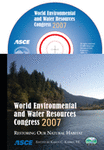Transboundary Water Resources: Hydrodiplomacy for Peace in the Middle East
Publication: World Environmental and Water Resources Congress 2007: Restoring Our Natural Habitat
Abstract
In the Middle East and in the regions of North Africa, water is an element that links nations and people, regardless of their ethnic origin, religious or even the personal feelings they have for one another. In the coming years, this natural important resource may become a reason for war or peace, destruction or calming, separation or reconciliation. Even if diplomatic efforts are deployed and institutional arrangements established, the needs for water will remain; people will not stop from drinking, irrigating their lands or developing their industries. The only option that remains to the nations of this region will be to find a solution to deal with the problem of this rare resource in a cooperative way, based on techno-economic criteria as far as resources, availability, actual and future needs is concerned and this within an integrated and equitable water management context. The complexity of the region cannot tolerate simple, immediate and non planned solutions that may cause unforeseeable, brutal and uncontrolled reactions that may embrace the whole region of the Middle East. The UN Report entitled "Water for Life Water for People" 2003, has listed 263 international trans- boundary basins. Beyond their significance in terms of area and conflict potential, these basins: 1) Cover 45 % of the land surface of the earth 2) Effect 40 % of the world's population 3) Account for approximately 80 % of the global river flow 4) Cross political boundaries of 145 nations. The hydro-geographical setting of Lebanon (10,452 Km2) account for about 40 rivers and streams of which 12 are most important watercourses. The Lebanese territory has been subdivided into 5 major hydro-geographical basins managed by 5 water authorities newly created (2001) and expected to function within the spirit of Integrated Water Resources Management (IWRM) in contrast with the "traditional" fragmented and abolished 22 water authorities and 320 water irrigation commissions. A part of Lebanon's hydrological watercourses flow into neighboring countries crossing the Lebanese Southern, Northern and North Eastern borders. A closer look to the UN Report "Water for Life Water for People" 2003 shows that 3 trans-boundary watercourses implicate the Lebanese territory. Beyond their importance in terms of area and political impact consumed, a look at the number of countries that share the Jordan River basin (see Table 2) highlights the precarious setting of any simple and non equitable mechanisms for sharing water within the involved countries. Based on these complicated facts and patterns of harmonizing mechanism for sharing water, an example of cooperation within the context of hydro-diplomacy in the Middle East between Lebanon and Syria ended towards an equitable and sustainable management of the Orontus and Nahr el Kabir rivers based on the UN convention on non navigational uses of International Watercourses.
Get full access to this chapter
View all available purchase options and get full access to this chapter.
Information & Authors
Information
Published In
Copyright
© 2007 American Society of Civil Engineers.
History
Published online: Apr 26, 2012
Authors
Metrics & Citations
Metrics
Citations
Download citation
If you have the appropriate software installed, you can download article citation data to the citation manager of your choice. Simply select your manager software from the list below and click Download.
